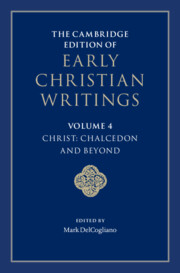Book contents
- The Cambridge Edition of Early Christian Writings
- The Cambridge Edition of Early Christian Writings
- The Cambridge Edition of Early Christian Writings
- Copyright page
- Contents
- Notes on Contributors
- Acknowledgments
- Note on the Texts and Translations
- Abbreviations
- Series Introduction
- Introduction
- Part I The Council of Chalcedon and Its Reception
- Part II Christological Perspectives after Constantinople II
- 20 Emperor Justin II, The Second Henotikon
- 21 Gregory the Great, Selections from his Homilies
- 22 Gregory the Great, Letters 1.24, 10.21, and 11.52
- 23 Anonymous Apology for Narsai
- 24 Babai the Great, On the Union 9 and 17
- 25 Sophronius of Jerusalem, Synodical Letter 1.6 and 3.1–17
- 26 Ekthesis of Emperor Heraclius
- 27 Maximus the Confessor, Ambiguum 31 to John
- 28 Maximus the Confessor, Ambiguum 5 to Thomas
- 29 Maximus the Confessor, Opusculum 3
- 30 Maximus the Confessor, Opusculum 6
- 31 Maximus the Confessor, Opusculum 7
- 32 Typos of 647/8
- 33 Acts of the Lateran Synod (October 649): Selected Proceedings and the Synodal Definition
- 34 Acts of the Third Council of Constantinople (680–681): Selected Proceedings and the Synodal Definition
- 35 John of Damascus, On Composite Nature against the Leaderless
- 36 John of Damascus, On the Faith against the Nestorians
- 37 John of Damascus, An Exact Exposition of the Orthodox Faith 57–58
- Suggestions for Further Reading
- Scriptural Index
37 - John of Damascus, An Exact Exposition of the Orthodox Faith 57–58
from Part II - Christological Perspectives after Constantinople II
Published online by Cambridge University Press: 11 February 2022
- The Cambridge Edition of Early Christian Writings
- The Cambridge Edition of Early Christian Writings
- The Cambridge Edition of Early Christian Writings
- Copyright page
- Contents
- Notes on Contributors
- Acknowledgments
- Note on the Texts and Translations
- Abbreviations
- Series Introduction
- Introduction
- Part I The Council of Chalcedon and Its Reception
- Part II Christological Perspectives after Constantinople II
- 20 Emperor Justin II, The Second Henotikon
- 21 Gregory the Great, Selections from his Homilies
- 22 Gregory the Great, Letters 1.24, 10.21, and 11.52
- 23 Anonymous Apology for Narsai
- 24 Babai the Great, On the Union 9 and 17
- 25 Sophronius of Jerusalem, Synodical Letter 1.6 and 3.1–17
- 26 Ekthesis of Emperor Heraclius
- 27 Maximus the Confessor, Ambiguum 31 to John
- 28 Maximus the Confessor, Ambiguum 5 to Thomas
- 29 Maximus the Confessor, Opusculum 3
- 30 Maximus the Confessor, Opusculum 6
- 31 Maximus the Confessor, Opusculum 7
- 32 Typos of 647/8
- 33 Acts of the Lateran Synod (October 649): Selected Proceedings and the Synodal Definition
- 34 Acts of the Third Council of Constantinople (680–681): Selected Proceedings and the Synodal Definition
- 35 John of Damascus, On Composite Nature against the Leaderless
- 36 John of Damascus, On the Faith against the Nestorians
- 37 John of Damascus, An Exact Exposition of the Orthodox Faith 57–58
- Suggestions for Further Reading
- Scriptural Index
Summary
The magnum opus of John of Damascus is The Fount of Knowledge, a trilogy consisting of The Philosophical Chapters (aka Dialectica, CPG 8041), On Heresies (CPG 8044), and the dogmatic part, An Exact Exposition of the Orthodox Faith (CPG 8043). From its appearance it has been considered a monumental achievement, and it is sometimes referred to as the first summa theologica. Translated here are two chapters from the Exposition: a short chapter (57=Exposition III 13) on the properties of the two natures of Christ, and a longer chapter (58=Exposition III 14) on the two wills of Christ. The two wills remained a live issue for the Jerusalem church for a number of reasons. In 685 a delegation was sent by the Chalcedonian leadership of Syro-Palestine (ostensibly from Jerusalem, but Jerusalem had no bishop at this time and the leadership resided in Damascus) to Constantinople to acknowledge acceptance of the Council of Constantinople (680–681).
- Type
- Chapter
- Information
- The Cambridge Edition of Early Christian Writings , pp. 645 - 653Publisher: Cambridge University PressPrint publication year: 2022

